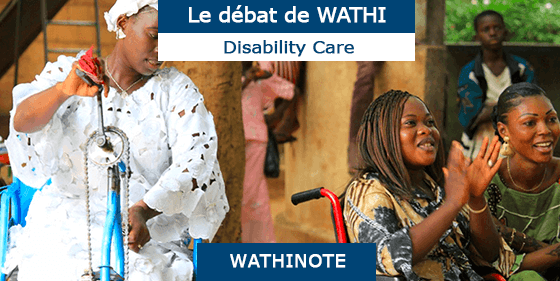

Author: Faustina Van Aperen, ILO ACTRAV
Affiliated Organization: Public Services International
Type of publication: Press Article
Date of Publication: April 2019
While the international average number of persons with a disability (PWD) is 10%, in Liberia the number reaches 16%. The causes range from congenital conditions and birth trauma to accidents and sickness. The two civil wars in Liberia between 1999 and 2003 also caused an increase in the numbers of PWD. The Liberian Government is calling for actions to promote the cause and interests of PWD, including access to social protection and decent work.
According to Morgan Ashenfelter, in his 2013 article Changing Liberian Attitudes Toward the Disabled, “People with Disabilities have it tough in Liberia: Educational facilities do not cater to their needs, employment is difficult to find, sidewalks barely exist in the city and most businesses and government buildings do not even have a ramp… In addition, some disabilities, such as post-traumatic stress disorder or missing limbs, are stigmatized, as they are associated negatively with the war”.
While the international average number of persons with a disability (PWD) is 10%, in Liberia the number reaches 16%
On a positive note, Liberia established the National Commission on Disabilities in November 2005, and adopted the National Decent Work Act. At the international level, Liberia has ratified 25 International Labour Conventions (only 14 are in still in force) including six out of the eight ILO Fundamental Labour conventions (the exceptions are C100 and C138). In 2012, Liberia ratified the United Nations Convention on rights of People with disabilities. However, effective implementation of these international labour norms has still to become reality.
African Heads of State adopted a Protocol to the African Charter on Human and People’s Rights on the Rights of Persons with Disabilities in Africa on 31 January 2018. It has four strong provisions on people with disabilities’ rights: article 17 is Right to Work, article 14 is Right to Education, article 13 is Accessibility and Article 7 is Right to Life.
The members of Liberia Labour Congress recognised that since the 14 years of civil war which ended in 2003, the nation has made significant progress towards decent work for all. But at the same time, they expressed their concerns about the lack of effective protection for people against social risks in their country (lack of assistance to children living with disability, aging, accidents, job loss, inadequate pensions…).
This situation means that persons with disability continue to be subject to social, economic and cultural injustice. The nation also deprives itself of the benefit of the 16% PWDs’ labour contributions. The lack of an effective social protection system keeps the majority of PWD in a vulnerable condition, preventing them from enjoying decent work for all and social inclusion.
The workshop reached the following decisions for action:
- Develop National Awareness Raising on decent work for and with people with disabilities.
- Hold partners meetings and engagements with line ministries, international partners and relevant social partners and groupings/institutions.
- Demand the government ratifies and implements ILO Conventions C138 and C100, with regulations that promote accessible employment within the private and public sectors for PWDs without discrimination, and ensure a legal framework and public services to support the implementation of ILO Conventions that have been ratified in relation to PWD.
- Ensure the Liberia Labour Congress engages relevant stakeholders and conduct a Labour Force Survey with full inclusion of the people with disabilities; to lobby government to ensure the establishment of a desk for people with disabilities at the Ministry of Labour to be headed by person with disabilities; engage employment institutions both in the private and public sectors to ensure decent work for PWD through social dialogue; work in collaboration with line ministries (especially the ministries of Education, Health, Labour, Gender and Justice) to ensure people with disabilities are fully included and are not discriminated against in terms of education, employment and social protection.
In conclusion, People with Disabilities deserve a good health delivery system, education facilities, legal protection, a national social security coverage, and equal employment opportunities with equal protection under the law.
To lobby government to ensure the establishment of a desk for people with disabilities at the Ministry of Labour to be headed by person with disabilities
As children with disability and their mothers are the most vulnerable, they should be considered a national priority in the implementation of the national social protection system. Liberia Labour Congress calls on the Government and the Liberian Chamber of Commerce to join efforts in the building of a national social protection of children and their mothers, as an integral part of actions for decent work for all.
Les Wathinotes sont soit des résumés de publications sélectionnées par WATHI, conformes aux résumés originaux, soit des versions modifiées des résumés originaux, soit des extraits choisis par WATHI compte tenu de leur pertinence par rapport au thème du Débat. Lorsque les publications et leurs résumés ne sont disponibles qu’en français ou en anglais, WATHI se charge de la traduction des extraits choisis dans l’autre langue. Toutes les Wathinotes renvoient aux publications originales et intégrales qui ne sont pas hébergées par le site de WATHI, et sont destinées à promouvoir la lecture de ces documents, fruit du travail de recherche d’universitaires et d’experts.
The Wathinotes are either original abstracts of publications selected by WATHI, modified original summaries or publication quotes selected for their relevance for the theme of the Debate. When publications and abstracts are only available either in French or in English, the translation is done by WATHI. All the Wathinotes link to the original and integral publications that are not hosted on the WATHI website. WATHI participates to the promotion of these documents that have been written by university professors and experts.
